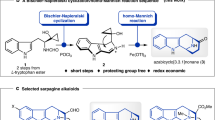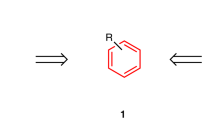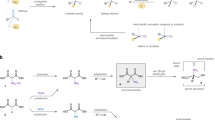Abstract
THE communication from Prof. Wilson Baker and his collaborator1 prompts us to intimate that we also have concerned ourselves with the sydnones, but from the point of view that their formation might be related to the racemization of α-acetylaminocarboxylic acids by acetic anhydride. Bergmann and Zervas2 adduced evidence that this change depended on enolization of the anhydro-compound to I.
This is a preview of subscription content, access via your institution
Access options
Subscribe to this journal
Receive 51 print issues and online access
$199.00 per year
only $3.90 per issue
Buy this article
- Purchase on Springer Link
- Instant access to full article PDF
Prices may be subject to local taxes which are calculated during checkout
Similar content being viewed by others
References
Nature, 158, 703 (1946).
Biochem. Z., 203, 280 (1928); compare Du Vigneaud and others, J. Biol. Chem., 96, 511 (1932); 98, 295 (1932); 99, 143 (1932).
J. Chem. Soc., 899 (1935).
Author information
Authors and Affiliations
Rights and permissions
About this article
Cite this article
KENNER, J., MACKAY, K. Structure of the Sydnones. Nature 158, 909–910 (1946). https://doi.org/10.1038/158909b0
Issue Date:
DOI: https://doi.org/10.1038/158909b0
This article is cited by
-
Sydnones
Nature (1947)
Comments
By submitting a comment you agree to abide by our Terms and Community Guidelines. If you find something abusive or that does not comply with our terms or guidelines please flag it as inappropriate.



